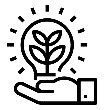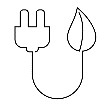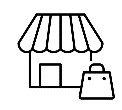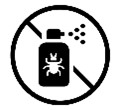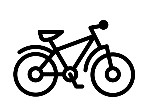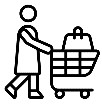In order for the City of Southfield to accomplish its sustainability goals, the City needs you to do your part in order to help enhance the quality of life in the Southfield community! Below are a few simple ways that you can follow to help your community thrive and reduce the environmental impact on our planet:
Reduce, Reuse, & Recycle
Be mindful of the quantity of materials you use and how you dispose of them. Evaluate whether something can be used more than once and if you can properly recycle it. The goals in materials management are to divert waste from overcrowded landfills, decrease greenhouse gas emissions, prevent pollution, and ultimately sustain a healthy environment. The practice of reduce, reuse, & recycle applies to all materials we use daily including food, clothes, plastics, metals, electronics, etc.
Consider Energy-Efficient Electronics & Appliances
If you are thinking about purchasing new home appliances or new computers, consider investing in a certified ENERGY STAR product. ENERGY STAR is a joint program of the Environmental Protection Agency (EPA) and the Department of Energy (DOE). The goal of this program is to help consumers and businesses save money and protect the environment through the adoption of energy-efficient products and practices. When shopping for products, look for the official ENERGY STAR certified logo. For a complete list of ENERGY STAR certified products, please visit the ENERGY STAR website.
Replace Light Bulbs with LED Bulbs
Replacing your traditional incandescent or florescent light bulb with a light emitting diode (LED) bulb saves energy, has a longer life span, and can reduce your utility bill. LED bulbs are 90% more efficient than incandescent light bulbs and have versatile applications for meeting illumination needs. It is recommended that ENERGY STAR certified LED lighting products be selected since they are tested for specific performance requirements that enhance the quality of the product.
Adjust Thermostat Settings
To save energy and reduce your utility bill, consider lowering the thermostat in the winter and raising it in the summer. According to the Department of Energy, you can save approximately 10% annually on heating and cooling by turning your thermostat back 7°-10°F for 8 hours a day from its normal setting. Consider investing in a programmable thermostat where you can set the temperature of your home on a reoccurring schedule or utilize a smart thermostat where you can control the temperature of your home with your smart phone or other smart devices.
Conserve Water
Did you know that bathrooms are the largest use of water in your home, using more than 50% of all indoor water? If you are looking to reduce the amount of water you use and reduce your water bill, consider installing low-flow fixtures inside and outside your home. Low-flow products may include faucets, showerheads, toilets and irrigation controllers.
According to the EPA, residential outdoor water use across the United States accounts for nearly 8 billion gallons of water each day, primarily for landscape irrigation. To conserve outdoor water, consider using a drip irrigation system or even eliminating your irrigation system. You can also store rainwater in rain barrels and use that water to replenish your lawn and landscaping.
When purchasing low-flow products, look for the WaterSense certified label. WaterSense is a voluntary partnership program sponsored by the Environmental Protection Agency (EPA). The goal of the program is to help consumers conserve water by identifying water-efficient products. For a complete list of WaterSense certified products, please visit the WaterSense website.
Plant Trees & Native Plants
Trees are essential for our survival and the health of our planet. They purify the air we breathe, filter our water, and provide habitat for wildlife. Additional benefits of trees you may have overlooked include increasing property values, enhancing neighborhood safety, reducing energy bills by naturally cooling buildings, and providing an aesthetically pleasing environment. We encourage all City of Southfield residents to plant trees at their homes. As of 2023, the City of Southfield has been recognized as a Tree City USA for 36 years by the Arbor Day Foundation.
Incorporating native plants in your landscape and garden help the environment by using less water and requiring less maintenance to thrive. Native plants are beneficial because they are plant species that are adapted to the climate and wildlife in a local area. Native plants often support habitats for pollinators like bees, butterflies, and birds. Follow these Michigan pollinator tips to start your own pollinator garden.
Shop Locally
With the popularity of online shopping, many people are meeting their retail needs with the click of a button. Businesses in your community depend on locals and guests to keep their business operating and staffed. The next time you are looking to purchase something, think about how you can support a local retailer, restaurant, or farmers market in your community. Take a break from the endless scrolling and step into a store or restaurant for a more authentic shopping or dining experience. Please check out Southfield’s City Centre website for information on local businesses, restaurants, and other amenities in the City.
Avoid Using Pesticides & Herbicides
Pesticides and herbicides have a known history of being harmful contaminants to soil, water, vegetation, humans, and wildlife when misused. Consider organic options for fertilizer and pest management. To learn more about healthy lawn and garden practices, please visit the MSU Extension website.
Compost Organic Waste
Composting food scraps and yard waste is another way to reduce the amount of waste collected in landfills. Composting is a natural way to recycle nutrients in the soil. Residential composting can occur in your own backyard with this basic formula in mind: 50% brown material (carbon) – dried leaves/straw, 25% green material (nitrogen) – grass clippings, leaves, fruit & vegetable peels, coffee grounds, & 25% soil or compost. For a detailed information on home composting, please refer to the Michigan Department of Environment, Great Lakes, and Energy’s (EGLE), home composting guide.
Use Alternative Modes of Transportation
In the United States, approximately 33% of greenhouse gas emissions are released due to transportation vehicles. Utilizing public transportation, carpooling, biking, and walking are some of the ways we can reduce our dependence on vehicles powered by fossil fuels. The City of Southfield contains an extensive trail system and convenient bike share program to encourage residents and visitors seeking alternative transportation options.
Properly Dispose of Hazardous Waste
Hazardous materials are characterized by being corrosive, toxic, flammable, and/or reactive. Some examples of hazardous materials include paints, cleaners, chemical sprays. Hazardous materials are NOT to be disposed of in the garbage. The City of Southfield is partnered with the Resource Recovery and Recycling Authority of Southwest Oakland County (RRRASOC) to educate residents on the proper way to dispose of common household hazardous waste. Please visit the City of Southfield Public Education Materials webpage to learn more about the proper ways to dispose of various materials, including household hazardous waste.
Shop with Reusable Grocery Bags
Americans use 100 billion plastic bags a year, which requires 12 million barrels of oil to manufacture. A reusable shopping bag, in some cases, can be reused up to 125 times and then recycled at the end of its useful life. Utilizing a reusable grocery bag will drastically reduce the amount of plastic bags you bring home and is better for the environment.
Educate yourself & your Community
The best way to understand what sustainability is and your impact on the planet is to read and research topics you are curious about. Please visit your local library or find credible sources from the internet to learn more about sustainability-related topics. Don’t know where to start? Visit the City of Southfield Green Links webpage to begin your educational journey and share what you have learned with members of your community!
Volunteer with Environmental Groups
If you have a passion for sustainability and becoming an advocate for the environment, there are many ways to get involved with non-profit organizations, educational institutions, and other local government groups. Many of these groups host a variety of volunteer events and workshops that can include planting trees, cleaning up waterways, removing invasive species, and promoting green infrastructure.


